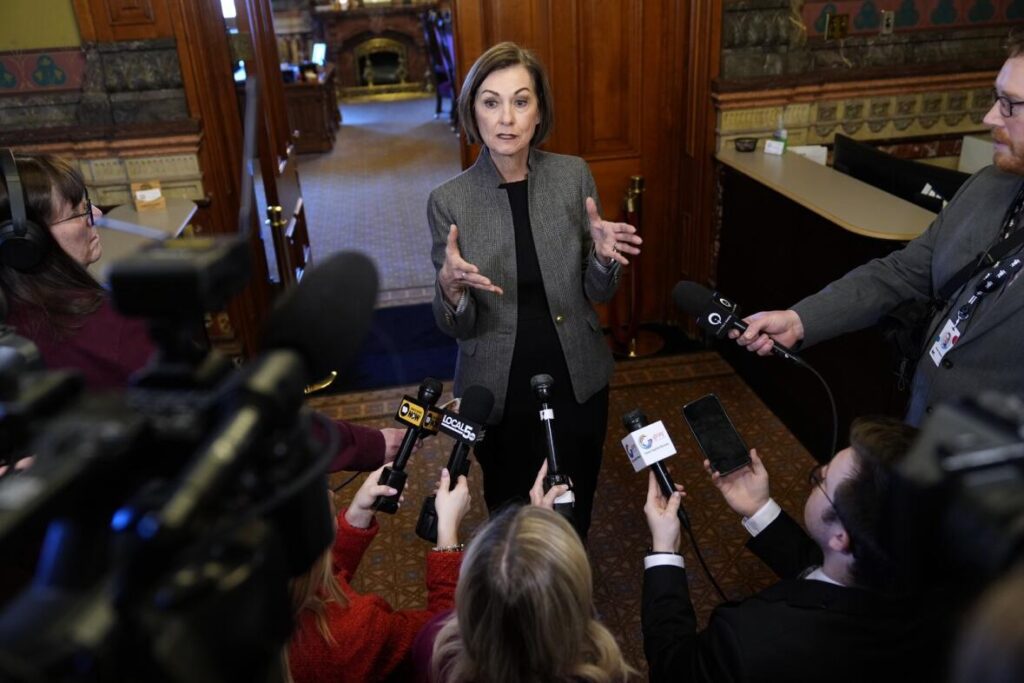Opponents argue it could give legal cover to discriminate against LGTBQ Iowans
By Tom Barton, The Gazette
DES MOINES — Iowa Gov. Kim Reynolds on Tuesday signed into law a measure supporters say will strengthen protections for religious expressions in Iowa.
Opponents contend it would give legal cover to discriminate against LGTBQ Iowans and others.
Reynolds signed Senate File 2095 into law during an event closed to media hosted by the Christian conservative group The Family Leader.
“Thirty years ago, the Religious Freedom Restoration Act passed almost unanimously at the federal level. Since then, religious rights have increasingly come under attack,” Reynolds said in a statement. “Today, Iowa enacts a law to protect these unalienable rights — just as twenty-six other states have done — upholding the ideals that are the very foundation of our country.”
Under the new law, state and local government shall not “substantially burden” someone’s exercise of religion unless it is in furtherance of a compelling government interest and must be narrowly tailored in the least restrictive means of pursuing that interest. A person, corporation, church, foundation, or other entity whose exercise of religion has been burdened would have the power to go to court to seek damages, injunctive relief, or other legal recourse.
The bill defines exercise of religion as action “substantially motivated by one’s sincerely held religious belief, whether or not the exercise is compulsory or central to a larger system of religious belief.”
Supporters say the bill is needed because, in their view, U.S. Supreme Court rulings have eroded religious freedom protections that were passed into federal law in 1993 by a Democrat-majority Congress and signed by Democratic President Bill Clinton.
The federal law applies only to the federal government, but at least two dozen states have passed state-level versions of the legislation.
House Democrats warned the bill would lead to state-sanctioned discrimination against LGBTQ+ Iowans and denial of reproductive health care, using religious freedom as a defense. Democrats introduced an amendment defeated by Republicans that would have inserted into the bill protections against discrimination as prescribed in the Iowa Civil Rights Act. The amendment aimed to restore the original purpose of the Religious Freedom Restoration Act (RFRA) while preventing its misuse to erode civil rights and sidestep non-discrimination laws.
Others said the bill would undermine inclusivity, and harm Iowa’s economy, making it harder for Iowa businesses to recruit workers from out of state and retain current residents. Several business groups and chambers of commerce were registered opposed to the bill, including Krause Group, the Technology Association of Iowa, Principal Financial Group, and the Iowa Chamber Alliance.
Rep. Steve Holt, a Republican from Denison and a lead sponsor of the bill, called the arguments against the bill “hyperbolic” and misinformed during floor debate. Holt said the bill protects religious freedom in a narrow way and requires a balancing test by courts when evaluating restrictions on religious freedom.
Rep. Charley Thomson, R-Charles City, said the legislation does not mean that a religious claimant is going to win.
“It just means that they’re going to get a hearing and a balancing test,” Thomson said during debate on the bill.
LGBTQ advocacy group One Iowa, in a statement, said the new law would allow broad religious exemptions that open the door for people to sidestep anti-discrimination laws.
“There’s no denying it: this bill is aimed at discriminating against LGBTQ+ Iowans, single parents, people needing reproductive healthcare services, and many more,” One Iowa Action Executive Director Courtney Reyes said in a statement.
Reyes said One Iowa “will work tirelessly to amend this law and restore the original intent of the federal RFRA when it was passed: to protect, not to discriminate.”
“Religion should never be weaponized to discriminate against others,” Reyes said. “Unfortunately, in its current form, that’s exactly what both the state and federal RFRAs allow.”
Planned Parenthood Advocates of Iowa, in a statement following the bill signing, said the new law threatens access to social services, health care and employment for all Iowans.
It noted arts-and-crafts retailer Hobby Lobby used the federal act to deny employees insurance coverage for birth control. And in 2014, a federal magistrate judge cited RFRA in ruling that a member of the Fundamentalist Church of Jesus Christ of Latter-Day Saints could not be required to cooperate in an investigation of child labor law violations.
“By signing this bill, the governor and Republican lawmakers who passed it are saying it’s OK to discriminate against our neighbors and then mask it as protecting our right to religious freedom,” said Mazie Stilwell, public affairs director of Planned Parenthood Advocates of Iowa. “Let me be clear — this is not about protecting religious freedom. But, rather, it’s part of a larger, harmful campaign to push a political agenda against the rights of LGBTQ+ people, women and other marginalized communities and should be seen as just that — not a protection but an attack.”
Greg Chafuen, legal counsel for Alliance Defending Freedom, said Americans should be able to defend their rights when their government stops them from living and worshiping according to their faith.
“This law provides a sensible balancing test for courts to use when reviewing government policies that infringe upon the religious freedom rights of Iowans,” Chafuen said in a statement following the governor’s bill signing. “The law doesn’t determine who will win every disagreement, but it does ensure that every Iowan —regardless of their religious creed or political power — receives a fair hearing when government action forces a person to violate his or her religious beliefs.”
Connie Ryan, executive director of the Interfaith Alliance of Iowa, said religious freedom is already protected under the Iowa and U.S. constitutions.
“Religious exemptions tip the balance heavily in favor of someone’s personal religious beliefs allowing them to discriminate against another person,” Ryan said in a statement. “The religious exemptions law weaponizes religious freedom, misusing it to take away the civil rights of another person.”
First published on April 2, 2024



